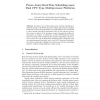Free Online Productivity Tools
i2Speak
i2Symbol
i2OCR
iTex2Img
iWeb2Print
iWeb2Shot
i2Type
iPdf2Split
iPdf2Merge
i2Bopomofo
i2Arabic
i2Style
i2Image
i2PDF
iLatex2Rtf
Sci2ools
127
click to vote
OPODIS
2008
2008
Power-Aware Real-Time Scheduling upon Dual CPU Type Multiprocessor Platforms
Abstract Nowadays, most of the energy-aware real-time scheduling algorithms belong to the DVFS (Dynamic Voltage and Frequency Scaling) framework. These DVFS algorithms are usually efficient but, in addition to often consider unrealistic assumptions: they do not take into account the current evolution of the processor energy consumption profiles. In this paper, we propose an alternative to the DVFS framework which preserves energy, while considering the emerging technologies. We introduce a dual CPU type multiprocessor platform model (compatible with any general-purpose processor) and a non-DVFS associated methodology which considerably simplifies the energy-aware real-time scheduling problem, while providing significant energy savings.
Distributed And Parallel Computing | Energy-aware Real-time Scheduling | OPODIS 2008 | Processor Energy Consumption | Real-time Scheduling Algorithms |
| Added | 30 Oct 2010 |
| Updated | 30 Oct 2010 |
| Type | Conference |
| Year | 2008 |
| Where | OPODIS |
| Authors | Joël Goossens, Dragomir Milojevic, Vincent Nélis |
Comments (0)

